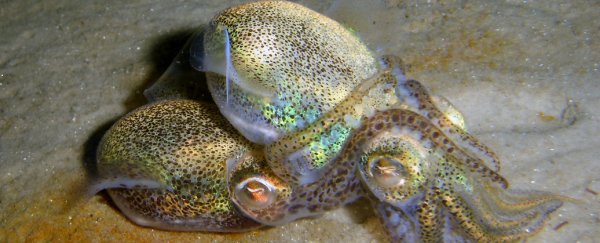A small species of squid living off the coast of Australia seems to favour sex (or reproduction) over safety, a new study has found.
While most living creatures share a biological urge to reproduce, mating in the animal world can be fraught with hazards: the act of sex might sap an animal's energy, making it harder for them to defend against an attack, or it might make them more visible to lurking predators. Whatever the case, there's an important trade-off between reproduction and survival that animals need to negotiate.
Some choose to delay sex to avoid danger, or find a more suitable partner, while others, well… they get it on. The dumpling squid (Euprymna tasmanica), it appears, belongs to the latter category – opting to continue copulation in the face of imminent danger.
Researchers at the University of Melbourne wanted to test whether dumpling squids modified their mating behaviour in response to predation risks. According to their paper in PLOS One, the researchers were interested in cephalopods because they have "excellent vision and cognitive ability", a tendency towards promiscuity in both sexes, and are soft-bodied, and therefore vulnerable to predation.
The researchers collected 15 pairs of male and female dumpling squid. They also collected 15 fish known as sand flathead – a natural predator found in the same coastal waters. The pairs were placed in separate containers, and according to Rachel Nuwer of Smithsonian.com, exposed to "various kinky scenarios, including introducing a predator before the squid began to mate, during mating and an hour after mating".
The researchers watched (from behind a black curtain) and filmed the mating sessions, noting any displays of defensive behaviour. This included inking, when squids eject a dark chemical cloud as a decoy to mask their presence, and jetting, when a squid moves away quickly by ejecting water from its body.
Watch this behaviour on display:
The female squids demonstrated a marked increase in inking, particularly when the predators were introduced into the tanks before mating had begun. The researchers say this "strong response" indicates that flathead fish are indeed "perceived as a significant threat". The males, who had been placed in the tanks 15 minutes before the females, likely didn't spray ink because they had more time to acclimate, and hide themselves in sand.
Despite the initial concern by females, the researchers report that the presence of the predator did not deter mating or shorten its length.
Furthermore, once mating had been initiated and completed, the squids tended to ignore the threat posed by the fish altogether, and displayed no defensive behaviour. It's possible this was due to exhaustion – as the same research group showed in 2012 that dumpling squid sex can last up to three hours, and can impair swimming abilities for up to 30 minutes.
The team has speculated that this behaviour might be due to the fact that the dumpling squid leads a short, solitary life. As a result, its reproductive success hinges on mating at the earliest opportunity, regardless of risky conditions.
Source: Smithsonian.com
